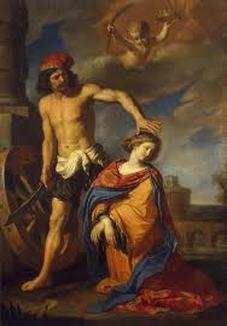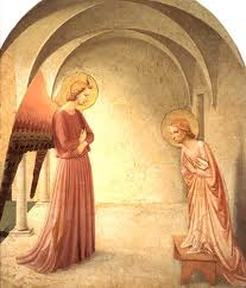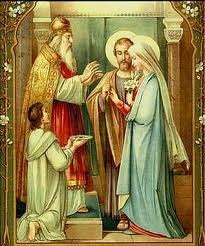
Virtue as we said at the very beginning of this catechism course is that which makes not only us good but also our action good as well. All good is compared with how it conforms to reason, and to our ultimate end.
To make our work and actions in accord and conformed to reason happens in 3 ways:
1. By making reason itself right, this is done as we saw by PRUDENCE.
2. By making our human affairs right, this is done by JUSTICE.
3. By removing the obstacles in order to do our human affairs by FORTITUDE AND TEMPERANCE
Now, our human will can be prevented from following reason in two ways:
· To be drawn by some object of pleasure other than what our reason tell us to do.
· To be not inclined of bothered to follow what reason says because of some difficulty that comes up.
In order to remove this difficulty fortitude of the mind is needed, just as to remove a heavy rock, that is in your way, requires strength of body.
To avoid something difficult involves some fear, because we fear something that is opposed to us and can cause us some lose or pain. Fortitude is principally about fear of difficult things, which can stop us from following our reason and cause us to do something we do not want to do. So in order to stand up to these obstacles we need also to be daring, that is to have courage, so as to free ourselves from these dangers now and if and when they may come back in the future.
The greatest natural good of our soul is the good of reason, when we go against this then we suffer a great lose and fall into sin. That which helps and guards us from the lose of this good is fortitude, which helps us in the face of these evils. The greatest evil to our souls is death, not only on a physical level, but also death of the soul to God and to His grace.
If Fortitude is a virtue and it is essential for virtue to tend to something good. It must be for some good then that man flees from the face of death. But dangers of death like sickness, storms at sea, attacks from robbers, as such similar things do not seem to come to a man from looking to obtain some good. But dangers of death which occur in battle come to a man directly on account of some good. He wishes to fight well and defend what is his own, be it his country, family household, or whatever, Thus he is defending the common good by a just fight. Fortitude then is concerned about the fear of dangers of death.
There are two kinds of combat, General when a man fights in battle and Private as when a man does not fear to say the truth or give the just judgement even though he faces the fear of the sword. Fortitude then, strengthens the mind against danger of death, not only in those general battles, but even those dangers that occur in single combat, which are also given the name of Battle. As St. Paul warns us of our battle, being not one necessarily a physical one, ' Put you on the armour of God, that you may be able to stand against the deceits of the devil. For our wrestling is not against flesh and blood: but against principalities and powers, against the rulers of the world of this darkness, against the spirits of wickedness in the high places.' Ephesians 6, 11-12.
A brave man behaves well when faced with the danger of any other kind of death, especially since he may be in danger of any kind of death on account of virtue. For example, a man may attend a sick friend even though he fear the deadly infection or he may travel vast distances for some holy cause with the fear of plane crashing, or a car accident, or a cruel death at the hands of barbarians, like the Crusaders did of old. Just as the martyrs faced all kinds of sufferings, which was a fight directed against their own person, but directed to the sovereign good which is God. This is why in the office that the Church prays for Martyrs they are said to be valiant in battle.
Martyrdom
Is it a virtue?
There is a problem because:
- It would seem that martyrdom is not an act of virtue for acts of virtue are voluntary, but martyrdom is sometimes not voluntary, like with the Holy innocents
- It is praiseworthy to offer oneself to do an act of virtue, but it is not praiseworthy to put oneself in an occasion of martyrdom, which would be rash and presumptuous.
The reward of beatitude is not due except for acts of virtue, “Blessed are they that suffer persecution for justice sake for theirs is the kingdom of heaven”. Therefore martyrdom is an act of virtue.
It belongs to virtue to safeguard the good of reason. Now the good of reason consists in truth as its object and justice as it effect. And martyrdom consists essentially in standing firmly to truth and justice against the threatening danger of death. Therefore it is obvious that Martyrdom is a virtue.
Solutions to the problems:
- The holy innocents in being killed obtained by God's grace the glory of martyrdom, which others obtain by their own will. Because shedding one’s blood for Christ's sake takes the place of baptism. What is called Baptism of Blood.
- A man must be prepared to do whatever is necessary and to do it whenever it is necessary. In other words to always be ready to act according to reason. Like the Boy Scouts 'Be Prepared'. Now in martyrdom this doing what is necessary consists in the right endurance of sufferings unjustly inflicted. But a man should not give another an occasion of acting unjustly, which is called presumption or being rash, asking for trouble as we commonly say. Yet if someone does act unjustly towards us we ought to endure it in moderation.
There is a problem again:
- Martyrdom means to witness, and witness to the Faith of Christ. But this seems more to do with the virtue of Faith than that of Fortitude.
- Martyrdom is related to Faith as to an end, that is, the end of suffering Martyrdom is for the Faith. The faith is the good which strengthens a man, the actual firmness and strength itself by means of which a man does not yield and stands firm against the contrary things thrown at him, which try and draw him from the good; this firmness is the virtue of Fortitude.
St. Thomas says that the pain of martyrdom obscures even the spiritual joy in an act pleasing to God, “unless the overflowing grace of God lift the soul with exceeding strength to things divine”. The brave man suffers injury not for its owe sake, but rather as a means to preserve or to acquire a deeper, more essential wholeness or perfection.
In the early Church martyrdom appeared as a victory, even though a fatal one. In Tertullian we read: “We are victorious when we are stricken down; we escape when we are led before the judge. For the Christian as for the “natural” man, “suffering for its own sake” is nonsense. The Christian loves his life, says St. Thomas, not only with a natural , life-asserting forces of the body, but with the moral forces of the spiritual soul as well. Joy, health, success, happiness, all these things are genuine goods, which the Christian does not toss aside and esteem but lightly- unless, indeed to preserve the higher goods, the loss of which would injure more deeply the inmost core of human existence











